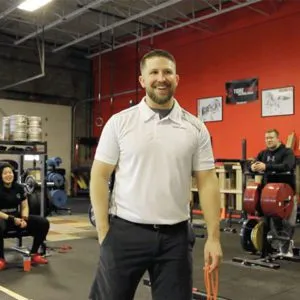In his 2011 book “Everything is Obvious, Once You Know the Answer” author and sociologist Duncan Watts takes a close look at the things we consider to be “common sense” and analyzes how we can make better predictions of outcomes. The title reinforces the old adage “hindsight is 20/20.” We’ve all likely had moments in life when we look back and think “how could I have not seen that coming?” In life we must all contend with factors out of our control, which means we must not only focus on the things that we can control, but also prioritize the things that will have the biggest impact on our outcomes. In the book, Watts looks at a plane crash and the half dozen or so factors that lead to the crash, and then poses the question “Would the crash still have happened if you removed any single one of those factors?” Of course we have no way of knowing that, we can only make a best guess. Whether you’re trying to lose weight or win at the highest level in your chosen sport, we are looking for a specific outcome. When we don’t get the outcome that we wanted, it’s important to analyze what happened, but it’s very easy to put the “blame” on the first thing we find. If we find fault in a more supplementary factor instead of a determining factor, we will start to focus our efforts in the wrong area.
Determining Factors vs. Supplementary Factors
First let’s define the difference between a determining factor and a supplementary factor. As the name suggests, determining factors have a big role in determining an outcome, while a supplementary factor may simply aid in an outcome. For example, a determining factor may be an athlete’s genetic potential, while a supplementary factor may be the quality of equipment they train with. While having nice equipment to train with makes life easier, it won’t (or at least shouldn’t) play a direct role in your success or failure. I often think of the stories my friend and former coach Billy used to tell us of the training in The Dominican Republic with rusty barbells, plates that would break when you dropped them from overhead, and the generally poor training conditions. While this list isn’t exhaustive, here are some things I think play a big role in outcomes when it comes to fitness and sport:
- Your attitude: To quote Henry Ford “Either you think you can or you think can’t, either way you’re right.” It seems very rare that people are able to do things when they don’t at least first believe that it’s possible. It’s an important distinction: Thinking you can vs. thinking you will. The former is confidence, the latter is arrogance. But attitude extends so far beyond thinking positively, it’s also about keeping an open mind, being gracious in defeat, and letting go of the past and factors you can’t control. Letting go of moments passed by is important both acutely and chronically. Think of a Weightlifter or Powerlifter that misses their opening attempt in a lift, and then falls apart for the rest of a competition. In a recurring sense, think of the person trying to lose weight who slips up on their diet over a weekend and spends the next week punishing themselves in the gym. Neither of those situations are conducive for long term success and make it clear that your attitude plays a big role in your outcomes.
- Your Sleep: There is no need to discuss in detail the importance of sleep at this point. The role of sleep in your health and performance has been discussed exhaustively on this blog and thousands of other resources on the web. If you aren’t taking your sleep seriously your results will significantly suffer.
- Your Nutrition: Much like sleep, nutrition is crucial to your success in any physical pursuit. This is in regards to total food quantity, but also food quality, particularly for performance. While body composition may be determined by macronutrients (proteins, carbs, fats), your body’s performance will be heavily influenced by micronutrients (vitamins and minerals), and highly processed foods are typically lacking in micronutrients.
- Consistency: Arguably being consistent could be higher on the list. Consistency is important not just in your training, but in the other factors listed above. A single healthy meal or one good night’s sleep won’t cut it. We are what we repeatedly do, which is why American is losing the fight against obesity. We consistently don’t sleep enough, we consistently eat too much calorie dense food, we consistently sit or at least don’t have much physical output. 3 hard hours a week in the gym pales in comparison to the other 165 hours you spend sitting, sleeping, etc… For athletes as it has been said a thousand times before: A decent program done consistently is always better than a perfect program done intermittently.
https://www.instagram.com/p/BccceZsjTPX
Now on to supplementary factors
- Where you train: This may sound crazy coming from a gym owner (especially one that produces positive outcomes more regularly than other facilities), but without the aforementioned determining factors, where you workout or train doesn’t matter. People who want something, and I mean really want it, figure out how to get it no matter what their circumstances, and that goes back to having the right attitude. Most people involved in the gym industry have little respect for Planet Fitness, yet despite the fact that they are lacking some seriously important equipment, ban clients from performing hugely beneficial exercises, and regularly serve their clients pizza and bagels, there are clients at Planet Fitness who have made huge life changes. I personally know people who have lost hundreds of pounds, come off of medications, and totally reshaped their physique training at Planet Fitness. The point is, while the gym they trained out created some serious obstacles for them, it ultimately didn’t effect their outcome.
- Programming: Again this may be surprising coming from a guy that’s effectively built an entire career on mastering the art of programming. A good program is definitely important, but the key is not to get too lost in the details. I truly believe there is a point where a program is simply good enough. Everything below that level likely will give you little-to-no results, and everything beyond that is a wash, particularly if more determining factors are not in play. Many clients and athletes come to us having seen the success of our community and are surprised or even disappointed with the simplicity of our programs. You can never be too good at the fundamentals, and the people that worry about all the smaller details are “majoring in the minors.”
- The Equipment You Use: From kids using milk crates as basketball hoops, to Domincan Weightlifters on rusted bars to African endurance heroes running barefoot, there are plenty of examples of why having a nice fancy gym to train in isn’t necessary. We keep Arkitect equipped with competition grade barbells and other quality training tools, but that’s because we can afford to do it, and we like to invest in the training instead of gimmicks, but it would be a stretch to say that nice equipment is a determining factor in your outcomes.
https://www.instagram.com/p/BeYA7lWjbIC
- Who you train with: If we’re talking about true team sports like football, it can play a bigger role, but as nice as it is to have good training partners, in reality your outcomes are on you in terms of creating physical change in your body, or winning in individual sports. Even in team sports, we’ve seen stand out performances from individuals or even championships won when the rest of the team isn’t of the same caliber.
Looking in the Mirror
What do you notice about all of the above factors? The determining factors are well within your own control, and the supplementary factors are largely matters of circumstance. I have had two nearly identical clients go on the same program, one with a positive attitude and trust in our methods, the other with doubt and incredulity, only to have the former succeed and the latter flake out and eventually quit. That goes back to attitude. To put it bluntly, winners look to themselves when they don’t get the outcome they want, the rest look to place the blame on someone, or some where else. To bring it full circle and really emphasize how important attitude is, even people who can’t take personal responsibility benefit from a positive attitude. Take your classic program hopper (a person that moves from method to method with never seeing anything thru long term). Since they think the program was the problem, they have a positive attitude because now that they’ve ditched “the problem” things should be looking up. This positive attitude results in an acute positive increase in outcomes. This is typically short lived however, because the thing they were attributing to their lack of success wasn’t a determining factor. Soon reality will kick in, and the results will be the same. Sometimes these clients or athletes will again switch gyms, coaches, programs, diets, etc… and the cycle will repeat itself. Which is why taking personal responsibility is the ultimate determining factor.




